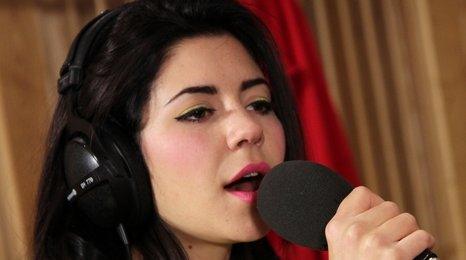Marina and the Diamonds: 'Co-writing is killing pop music'
- Published
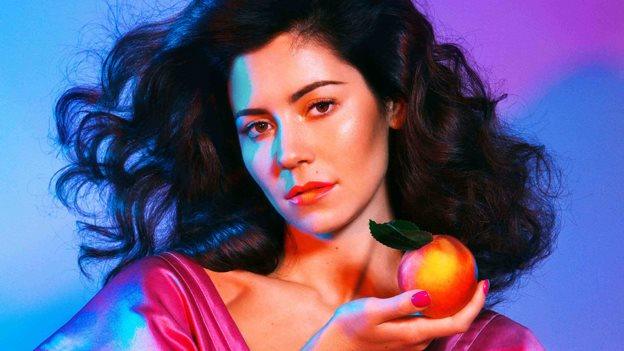
Marina Diamandis - aka Marina and the Diamonds - was raised in both Athens and Pandy, Wales
Marina and the Diamonds' last record went straight to number one, but it left her creatively dissatisfied.
So she ditched the superstar producers and wrote an album by herself.
"Pop should make you feel alive," she tells the BBC - but warns a glut of "generic" tracks, written by committee, are threatening to kill it off.

Marina Diamandis wants to set the record straight: She did not bankrupt her record label.
Mind you, she's only got herself to blame for the misconception.
In 2013, the singer told a Canadian newspaper, external that 679 Recordings was "bankrupt" and had "no money", after she insisted on shooting 11 videos for her second album, Electra Heart.
"I made a joke because I have a terrible sense of humour," she explains. "It wasn't true, but it's followed me for so long."
In fact, the singer says her balance sheet is "really good".
"I sold three million singles on Electra Heart so that's got to be going somewhere," she laughs. "I'm not that expensive an artist."
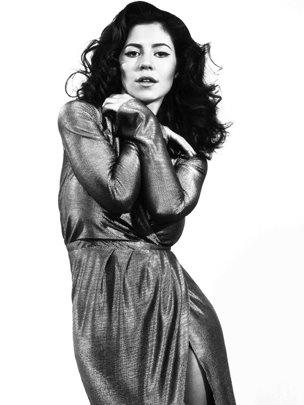
The singer wrote her first song about a butterfly when she was seven - it was so bad she didn't try again until she was 17
Indeed, she's been buying props for her next tour on eBay (a set of light-up grapes, since you ask) but that's not to suggest she's living on reduced means.
Her third album, Froot, has been sitting on top of the iTunes pre-order chart for months, thanks to her tightly-knit and on-the-ball fanbase.
Those fans - the "diamonds" of her stage name - have already received six of the tracks, which were released in monthly instalments before the full album is revealed next week.
It's an innovative release strategy - and one that was partly necessary, after the singer realised her subtle, slow-burning new material wasn't likely to feature on daytime radio.
"I actually said to the label, I don't want to have to depend on radio support, so I focused completely on the fans."
Originally, the plan was to issue "two songs a month that were polar opposites sonically, like double A-sides," says Diamandis, "but iTunes wouldn't let me do that".
"It was probably for the best, because with this strategy you still get half an album that you haven't heard yet.
"And it's been really creatively liberating," she says. "I have no commercial pressures any more. So I'm able to survive in a really weird way."
Dissatisfied
Half Welsh and half Greek, Diamandis was raised in Pandy, Monmouthshire, a tiny village of around 400 people, just over the Welsh-English border.
She wanted to be a pop star from the age of nine, but dropped out of stage school and vocal tech college. Undeterred, she worked in a petrol station to save money for a move to London, where she auditioned for girl bands, cruise ships and even the Lion King musical.
It was only belatedly that she realised she should try writing her own material. So she taught herself piano and, fortuitously, discovered an instinct for melody.
Oddball pop songs like Mowgli's Road, external and I Am Not A Robot, external won her a record deal and the runner-up position on the BBC's Sound of 2010, external list.
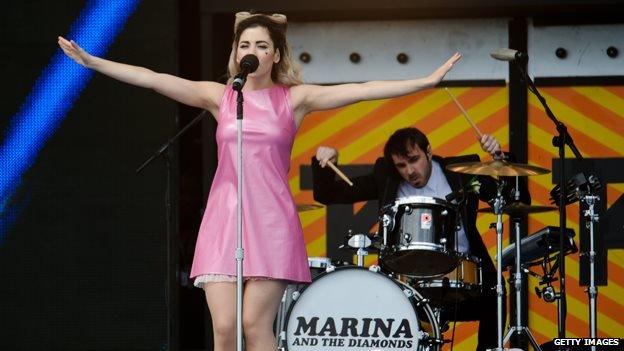
Electra Heart was partly an exploration of archetypal female characters, and partly about a harrowing break-up
Her debut album, The Family Jewels, went gold. The follow-up, Electra Heart, was written with a host of A-list producers, including Dr Luke (Katy Perry) and Shellback (Beyonce, Rihanna).
The album topped the UK charts, but Diamandis was discontented.
"Because I was working with such huge people, like Dr Luke, they weren't going to listen to what I had to say about production. It was more like: 'What's the successful sound right now?'
"And really it's a shame for me to do that, because I'm not that type of artist. That was the gripe. It was nothing to do with the songs. I love the songs."
She admits now that the brazenly bubblegum record was a compromise.
"When you look a certain way, a commercial way, labels immediately think you should be making commercial music."
She heeded the demands, but promoted the album in character as Electra Heart, "wearing a blonde wig and behaving like a cartoon".
When the campaign wrapped up, she killed off Electra Heart ("with sleeping pills") and made a startling discovery.
"I stopped touring after being on the road for four years… I wasn't desperate to succeed any more," she says. "I genuinely wasn't bothered.
"And I'm glad I feel like that now, because it's such a torment. People think it's great to be motivated and have this drive, but I never had a true egotistical side - like, for example, Madonna. She needed to be in everyone's minds. That's not something I want. So I was reassessing what I wanted."
Spirituality
Having cast off her demons, Diamandis hunkered down in semi-isolation to write her new album.
It features no co-writers and a single producer, Dave Kosten, who enlisted members of The Cure and Everything Everything to articulate the singer's newly minimalist material.

Diamandis says she wants to "subvert" pop by putting strong messages in her lyrics
The record opens with a bare bones ballad, pointedly called Happy, external, which begins: "I sang a hymn to bring me peace... and all the sadness inside me melted away."
The lyrics hint at a religious conversion ("I believe someone's watching over me") but the singer insists otherwise.
"My songwriting's always been peppered with stuff that could be connected with Christianity but I don't know why because I wasn't brought up Christian. I don't believe there's a God.
"Happy is more about spiritual topics than religious ones. It's thinking of loved ones that have passed away. We all hope there are loved ones looking after us."
She addresses religion elsewhere on the album - notably on Savages, which casts a weary eye over the world and decides: "I'm not afraid of God, but I'm afraid of Man."
Can't Pin Me Down, external, on the other hand, sees the singer defend herself against a character assassination: "You can paint me any colour / And I can be your clown / But you ain't got my number / No, you can't pin me down."
"That's actually about your field," she tells me with a devilish grin. "It's about what people write. What people think about me. About not being pigeon-holed."
Being misunderstood is a particular bugbear for the artist.
"If I'd never worn any make-up, and turned up in a little white t-shirt and jeans, I think I'd be viewed differently. But when you have a theatrical, distinctive image people get distracted. They think it's more shine than artistry.
"When you're seen as a pop star, people think of you as this weird 'thing' and you don't get any adult conversations."
Does she think there's room for complexity in pop music?
"Yes - but I don't think there's a lot of it about. People are scared to be complex. Especially lyrically.
"If you listen to lyrics on any radio station, you don't find anyone talking about anything deep or provocative.
"There are maybe a few artists who do that - Kanye is one of them. And those are the artists I veer towards.
"I'm like: 'Yes! Here's something that will challenge my own thoughts' - because that's what art should do. It should make you think. It should make you feel alive. It should make you feel something."
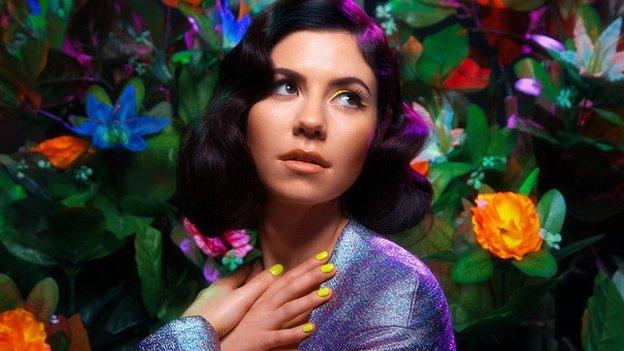
'I like the idea of blending nature and artifice visually,' says Diamandis
Returning to her earlier point, she says the "corporate" approach to song-writing inevitably leads to bland, identikit lyrics.
"Why am I the only artist on a major label that has written a whole album by themselves? I think that's weird. That's weird.
"I want to change the culture of all these bullshit co-writes where no-one's saying anything.
"I want to inspire people."
Froot is released on Monday, 16 March on Atlantic Records.
- Published7 January 2011
